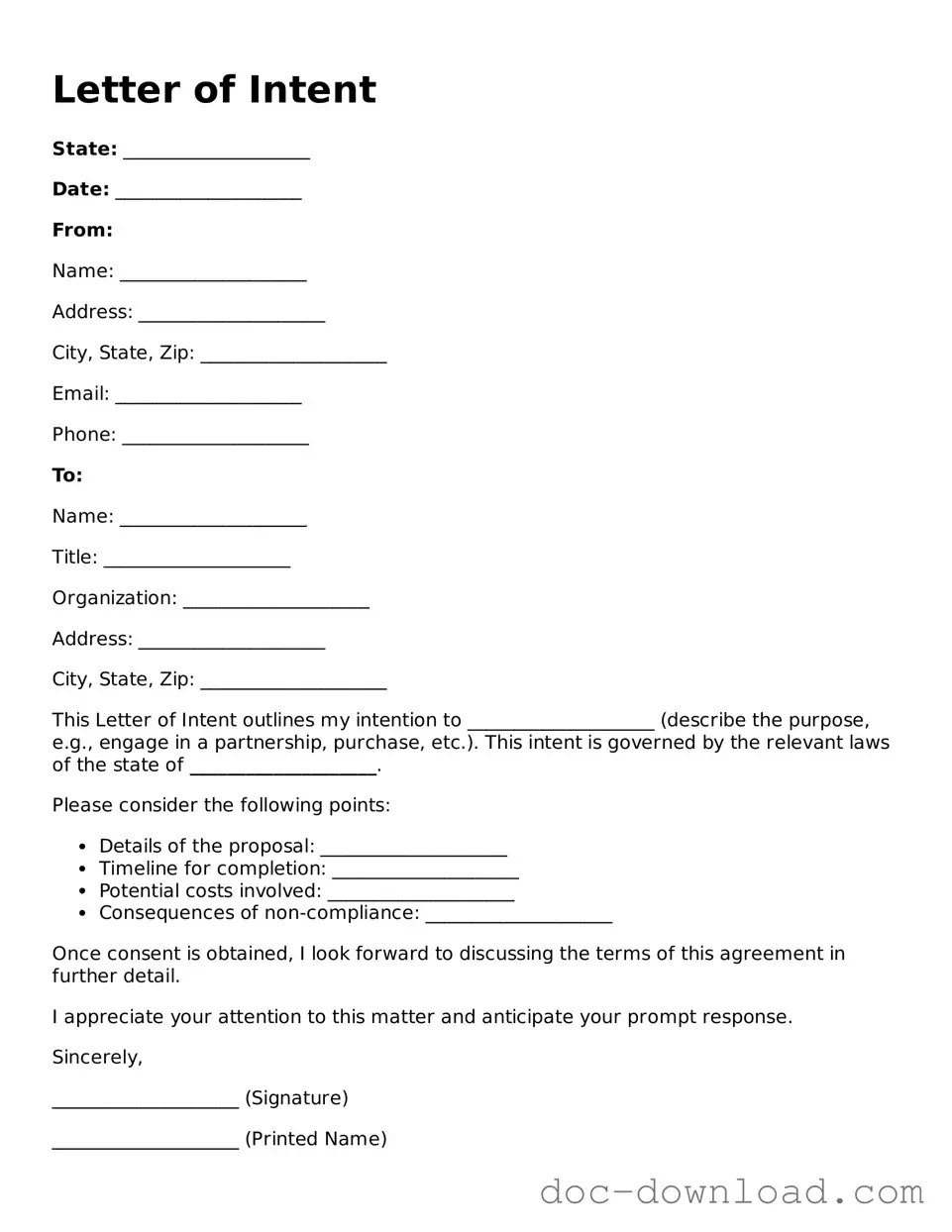Printable Letter of Intent Template
A Letter of Intent (LOI) serves as a preliminary agreement that outlines the intentions of parties involved in a potential transaction or partnership. This document plays a crucial role in business negotiations, as it establishes the groundwork for future discussions. Typically, an LOI includes key elements such as the purpose of the agreement, the parties involved, and the main terms and conditions that will guide the final contract. It may also address confidentiality, exclusivity, and timelines for further negotiations. While an LOI is generally non-binding, it signals a serious commitment to move forward, allowing both parties to outline their expectations and responsibilities. Understanding the nuances of an LOI can significantly impact the success of a business relationship, making it essential for individuals and organizations to approach this document with care and clarity.
Similar forms
A Memorandum of Understanding (MOU) is similar to a Letter of Intent in that both documents outline the intentions of parties involved in a potential agreement. An MOU serves as a preliminary agreement that establishes a mutual understanding of the terms and goals before formalizing a contract. While it may not be legally binding, it indicates a commitment to negotiate in good faith and can help clarify expectations between the parties.
A Term Sheet is another document that shares similarities with a Letter of Intent. It summarizes the key terms and conditions of a proposed deal, providing a framework for negotiation. Term Sheets are commonly used in investment and financing contexts, outlining aspects like valuation, equity stakes, and timelines. Like a Letter of Intent, it serves as a starting point for more detailed discussions and formal agreements.
A Non-Binding Agreement is akin to a Letter of Intent in that it expresses the intentions of the parties without creating enforceable obligations. These agreements typically outline the basic terms of a potential collaboration or transaction, allowing parties to explore opportunities without the pressure of a binding contract. This flexibility can be beneficial during early discussions, as it fosters open communication while protecting the interests of all involved.
In the realm of rental agreements, a thorough Lease Agreement document is fundamental for both landlords and tenants. This form not only delineates the rental terms but also establishes responsibilities and protections for all parties involved. By utilizing this template, users can ensure clarity and mutual understanding from the very beginning of their leasing arrangement.
An Offer Letter, particularly in employment contexts, resembles a Letter of Intent by outlining the main terms of a job offer. It details the position, salary, benefits, and other relevant information. While an Offer Letter is often more formal and specific, it shares the same purpose of conveying intentions and expectations before finalizing a contract of employment.
A Purchase Agreement is a more formal document that can also be compared to a Letter of Intent. While a Purchase Agreement is legally binding and includes detailed terms regarding the sale of goods or services, a Letter of Intent may precede it to outline the preliminary terms and intentions of the parties. This initial document can help facilitate discussions that lead to a comprehensive and enforceable Purchase Agreement.
Document Overview
| Fact Name | Description |
|---|---|
| Definition | A Letter of Intent (LOI) is a document that outlines the preliminary understanding between parties before a formal agreement is finalized. |
| Purpose | LOIs are often used to express interest in a business deal, clarify terms, and outline the next steps in negotiations. |
| Legally Binding | Generally, an LOI is not legally binding, but certain sections can be binding if explicitly stated. |
| State-Specific Laws | The governing laws for LOIs can vary by state. For example, in California, the California Civil Code may apply, while in New York, the New York General Obligations Law could be relevant. |
| Common Uses | LOIs are commonly used in real estate transactions, mergers and acquisitions, and partnership agreements. |
More Templates:
Employee Manual Template - Understand our commitment to diversity, equity, and inclusion for all employees.
To streamline the process of property transfer, it's essential to have access to the right resources, such as the comprehensive guide found at https://quitclaimdeedtemplate.com/michigan-quitclaim-deed-template, which can help clarify the details involved in completing a Michigan Quitclaim Deed.
Sellers Agreement - Ensures compliance with zoning laws and regulations.
Sample - Letter of Intent Form
Letter of Intent
State: ____________________
Date: ____________________
From:
Name: ____________________
Address: ____________________
City, State, Zip: ____________________
Email: ____________________
Phone: ____________________
To:
Name: ____________________
Title: ____________________
Organization: ____________________
Address: ____________________
City, State, Zip: ____________________
This Letter of Intent outlines my intention to ____________________ (describe the purpose, e.g., engage in a partnership, purchase, etc.). This intent is governed by the relevant laws of the state of ____________________.
Please consider the following points:
- Details of the proposal: ____________________
- Timeline for completion: ____________________
- Potential costs involved: ____________________
- Consequences of non-compliance: ____________________
Once consent is obtained, I look forward to discussing the terms of this agreement in further detail.
I appreciate your attention to this matter and anticipate your prompt response.
Sincerely,
____________________ (Signature)
____________________ (Printed Name)
____________________ (Date)
